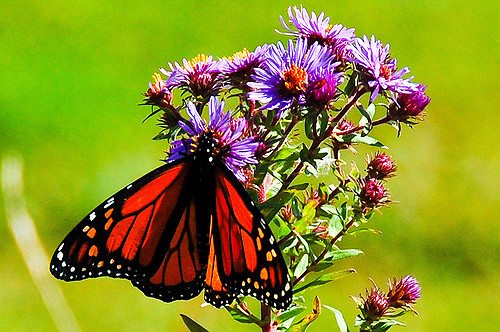
(cc) Jeff Power
Today’s article written by Thomas Schenk … A while back, I was discussing Spiritual Naturalism with an acquaintance who is Christian. It was his opinion that without belief in a personal god and an afterlife, what we call spirituality is just a refined form of hedonism. I can understand his thinking this. Spirituality in any of its deeper forms requires discipline and sacrifice. For a person who seeks a god’s blessing or hopes for better things in an afterlife, sacrificing one’s current well-being makes sense. But without such belief, what sense does it make? This question got me thinking.
An obvious response is: “what is wrong with enhancing our well-being in this life? It’s the only life we’ve got, so why not live it as well as we can?” The word “hedonism” is associated with the Greek philosopher Epicurus. Epicurus’ philosophy, to put it in the simplest terms, is that the good is what is pleasurable and the bad is what is painful. To quote from the Wikipedia: “Although Epicurus has been commonly misunderstood to advocate the rampant pursuit of pleasure, his teachings were more about striving for an absence of pain and suffering, both physical and mental….”
But even those “hedonists” who advocate the rampant pursuit of pleasure realize that maximizing well-being requires restraint. Overindulgence in pleasure results in pain — think of your worst hangover ever — so it requires discipline to maximize pleasure and minimize pain. While theists may discipline their sensuality because they believe that indulgence in sensuality is sinful, the Epicurean disciplines his or her sensuality to enhance overall enjoyment here and now. Yet, in such a disciplined approach to life, both share something in common.
To development a more refined approach to our enjoyment of this life is certainly a legitimate aim of a naturalistic spirituality. As compared to just living haphazardly, I think it reasonable to call the cultivation of a more disciplined and intentional approach to life, spiritual.
What does “a more refined approach” mean? To answer this, it is helpful to explore some of the words we use to describe our well being. The words “pleasure,” “happiness,” “delight,” and “joy” are among the words most frequently used in regard to well-being. In common discourse, we tend to treat these words as synonyms. For the purpose of this discussion, I want to give each term a distinct meaning. I am not suggesting that these are the correct meanings, only that the distinctions I am making may help us gain a more nuanced understanding of our well being. I define the words as follows:
“Pleasure” is well-being particularly associated with the tactile senses – feeling, taste and smell. Eating, drinking and sexuality being obvious examples. The opposite of pleasure is pain.
“Happiness” is well-being that is particularly associated with our interactions and relationships with other people. Lively conversation is an obvious example. The opposites of happiness are loneliness and boredom.
“Delight” is well-being particularly associated with the experience of beautiful or well-crafted things, whether natural or artificial. The opposite of delight is revulsion.
“Joy” is well-being particularly associated with the experience of love, not only love of other people but also love of more abstract entities such as truth or virtue. The opposites of joy are grief and sorrow.
Each of these terms refers to a desirable state. As we move from the first term to the last, we move from terms where the object of our enjoyment is external to us, to terms where it is more internal. And we move from terms that define states that are relatively ephemeral to states that can be quite enduring.
By nature, most people can enjoy pleasure and happiness as I have defined them here. The activities that lead to delight and joy require more cultivation. The appreciation of great art, for instance, requires knowledge and mental focus. In short, it requires a least some degree of contemplation. Such contemplation helps us enter into the experience of beauty.
As to the joy of love, one might argue that this also is a natural ability available to everyone. Yes, everyone can fall in love. But to ascend in love is not so easy — to develop the kind of love that lasts a lifetime. This too requires effort and sacrifice. As to more abstract forms of love, like the love of truth and virtue, many people live their whole life with little experience of these.
Regarding the terms of our well being as I have defined them, we can see why erotic love is so highly valued. In the presence of our beloved we experience the joy of shared love, delight in the loved one’s beauty, the happiness of being in his or her company, the pleasure of eating and drinking together and of sex, which is probably the most intense form of pleasure. While it last, erotic love is the complete deal. But the ascent of love I mentioned above requires something of a movement from the intoxication of erotic love to the more sober, disciplined forms of love that come with such things as raising a family and trying to improve one’s community.
The notion of “ascent” that I used in opposition to “falling” in love, has long served as a metaphor for spiritual activities. We have an “inclination” to do the things that are most natural to us. Going with gravity is easier than climbing against it. Eating is natural to us, dieting is not. For many people, gaining weight is easy but losing it hard. Letting the mind wonder as it will is also easy, focusing it in contemplation is hard. Pursuing the spiritual course is never easy, though with time it can become easier. (Here I am using the word “natural” in the limited sense of opposed to the intentional or artificial, rather than in the inclusive sense wherein all human activities are a part of Nature.)
Getting back to the question of the sense of spirituality when it is not related to a god or an afterlife, I might respond: naturalistic spirituality promotes a more mindful and intentional approach to life. Without denigrating the simple pleasures of this life, it helps us cultivate a more refined sense of well being. And although I haven’t really developed this idea here, it should also inspire us to act more responsibly toward the larger contexts of our natural and social world on which our well being depends.
If Spiritual Naturalism could do nothing more for us than this, that would already be a strong recommendation for it. But it can do more. Spirituality can open us to something greater than even the most refined forms of hedonism, something that transcends the very category of personal well-being.
Most of the spiritual traditions that make this claim of transcendence, make it in relation to something supernatural or metaphysical. The theist thinks a transcendent Being somehow transmits this experience, out of their love, or whatever. I can find no justification or even rationality in this belief, and it certainly defies my experience. The condition for a transcendent spiritual experience is not sent to us from elsewhere, but is a part of our nature — albeit a mysterious part. It lies like a seed within us. We cannot make this seed blossom by an act of our will or strategy of thought. But through the cultivation of mindfulness and love we can create the conditions upon which it might bloom and usually will bloom.
The mindfulness and love of Spiritual Naturalists has one big advantage over that of theists, it is focused on something that actually exists. I would not say this to my Christian acquaintance — it wouldn’t be polite and he simply wouldn’t agree. But it is why I can smile at his statement suggesting that relative to his there is something inferior about our form of spirituality.
Subscribe to The Spiritual Naturalist Society
Learn about Membership in the Spiritual Naturalist Society
__________
The Spiritual Naturalist Society works to spread awareness of spiritual naturalism as a way of life, develop its thought and practice, and help bring together like-minded practitioners in fellowship.












